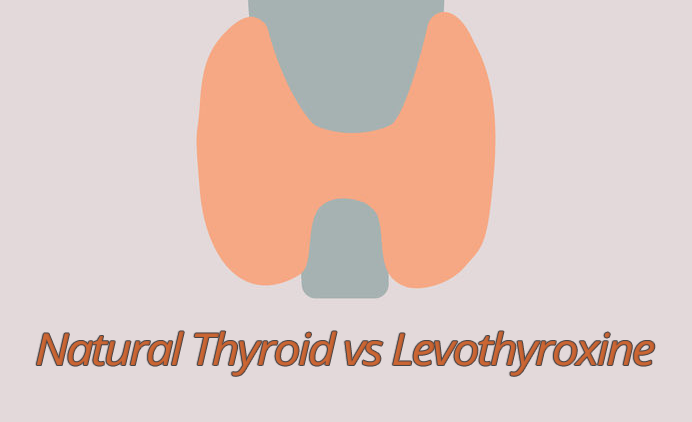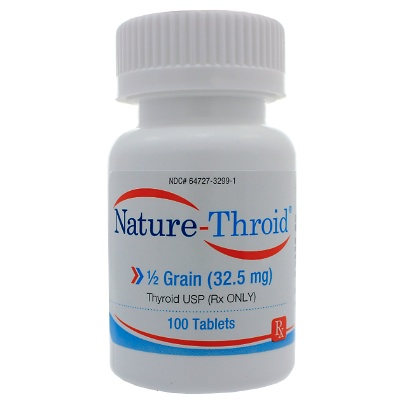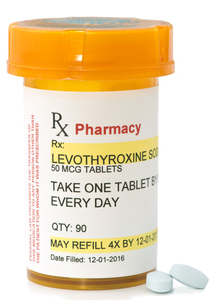Insufficient production of thyroid hormone, hypothyroidism, induces a multitude of symptoms that affect our health and quality of life. Treatment options for underactive thyroid gland focus on intake of medications that stimulate the production of hormones.
Two different forms of medications are available: natural thyroid and levothyroxine. These two drugs have the same role, to improve hormone production, but their underlying mechanisms and everything about them is different.
Natural Thyroid
The natural thyroid also referred to as a desiccated thyroid is a drug created to improve thyroid hormone production.
The most well-known brand names of this drug are Armour Thyroid, WP Thyroid, and Nature Thyroid.
Although natural desiccated thyroid (NDT) can be referred to as thyroid extract, it is important to not mix it up with the “thyroid extract” labels you see in health stores or online. NDT drugs are available with doctor’s prescription only.
The drug was first developed back in the 1900s and the earliest form came from the thyroid gland of cows, but later researchers focused on pigs.
Natural thyroid contains both T3 (triiodothyronine) and T4 (thyroxine) as well as calcitonin and other elements found in the thyroid gland.
Levothyroxine
Levothyroxine or L-thyroxine is a drug manufactured from the thyroid hormone T4 with the purpose of treating thyroid hormone deficiency.
You have probably come across brand names such as Synthroid, Levoxyl, Tirosint, and Unithroid.
The use of levothyroxine came as a step forward and an improvement in the way we treat and manage hypothyroidism. It also brought a new era where levothyroxine became more commonly used while NDT drugs were pushed aside.
Unlike natural desiccated thyroid which uses a dried and powdered pig’s gland, levothyroxine is a synthetic version of T4. Thyroxine was first isolated back in 1914 in its pure form by Edward Calvin Kendall at Mayo Clinic. A synthetic version of hormone replacement therapy has been available since 1927 when British chemists Barger and Harington synthesized thyroxine for the very first time.
In addition, levothyroxine is on the List of Essential Medicines published by the World Health Organization. The list contains the most effective and safe medicines for our health system.
Similarities Between Natural Thyroid and Levothyroxine
Even though these drugs are different there are some similarities between them. But before we discuss differences between natural thyroid and levothyroxine, let’s see how they are similar to each another.
Neither levothyroxine nor natural thyroid correct autoimmune dysfunction. Basically, they just function to support sufficient thyroid hormone levels. This means that management of autoimmune thyroid condition such as Hashimoto’s thyroiditis shouldn’t revolve around levothyroxine alone.
Both levothyroxine and natural thyroid can reverse T3 in the body.
It is more useful to take both of these drugs in the morning due to the energy boost they provide. On the other hand, taking them before bedtime may induce insomnia. Another thing they have in common is that you should take both natural thyroid and levothyroxine on an empty stomach.
You need a prescription to get any of these drugs.
Intake of these medications requires same lab tests.
Neither natural thyroid nor levothyroxine serve for prevention of thyroid cancer. One of the most common misconceptions about these medications is that just because they’re formulated to support thyroid hormone levels they immediately resolve every thyroid-related problem. Don’t forget that these drugs have the primary function to ensure sufficient levels of thyroid hormones.
Drinking coffee at least 30 minutes after taking any of these medications isn’t recommended. The reason is simple: coffee can impair the efficacy of the drugs by decreasing intestinal absorption. For example, one study found that coffee should be added to the list of things that affect intestinal absorption of T4.
Both natural thyroid and levothyroxine have similar side effects. For example chest pain/discomfort, changes in the menstrual cycle, fast or irregular heartbeat, fever, tremors, irritability, sweating, vomiting, and nausea, just to name a few.
Differences Between Natural Thyroid and Levothyroxine
Both drugs serve the same purpose of ensuring sufficient thyroid hormone levels but they have more differences than similarities. And to compare them more accurately, it is important to discuss the points where they differ.
The primary difference is in the nature of these medications. While levothyroxine is a synthetic version, bio-identical to T4 produced in our body, NDT is derived from pigs, purified, and is not bio-identical to hormones produced by the human thyroid gland.
Levothyroxine, as you can conclude based on its name, contains T4 only while natural desiccated thyroid medication contains both T3 and T4. T3 is more biologically active than T4.
Even though the actions of levothyroxine may take a few hours, natural desiccated thyroid works within an hour. One study investigated the efficacy of natural thyroid compared with levothyroxine in hypothyroid patients. Scientists enrolled 70 participants who were randomized into two groups: those who received natural thyroid and those who received levothyroxine.
The results, published in the Journal of Clinical Endocrinology and Metabolism, showed that natural thyroid therapy didn’t result in significant improvement in the overall quality of life; but it caused modest weight loss in participants. In addition, the study showed that 48.6% of the participants expressed their preferences for natural thyroid drug.
When looking at the differences between levothyroxine and natural thyroid, it is important to mention that brand names like Armour Thyroid and Synthroid have a different relationship with the FDA. Synthroid has recently gone through the new FDA approval process (since it was not around when Synthroid first came into the market) while Armour Thyroid and other natural desiccated thyroid treatments, have not.
Controversies Behind Natural Thyroid
Bearing in mind that drugs like Armour Thyroid are natural desiccated thyroid hormones, it would be expected that they would be more widely used than the synthetic versions. But the opposite is true when it comes to levothyroxine and NDT.
After levothyroxine was isolated and discovered, it pushed NDTs from the go-to option for better thyroid health. To most doctors, this is entirely justified. In fact, natural thyroid is a controversial drug.
For example, the American Journal of Medicine published the results of a study which showed that natural thyroid should be discontinued as a thyroid medication due to the fact it produces hormone levels that are misleading estimates of the thyroid function. The drug can also induce thyrotoxic symptoms.
The main problem regarding natural thyroid is lack of education about the benefits of the drug. Ever since levothyroxine came into use and NDTs were neglected, generations of young doctors were trained to understand the synthetic drug and its efficacy.
In fact, many doctors aren’t even aware that natural thyroid hormone drugs are still around, which is why they don’t prescribe them to their patients. Of course, extensive branding and marketing plays a role here.
Also, some doctors believe that prescribing natural desiccated thyroid is difficult because there is a great deal of unavailability from batch to batch which can lead to TSH fluctuations.
Probably the most shocking revelation, which has nothing to do with the drug itself, shows that NDT medication is somehow receiving an unjust treatment. How? Most controversial statements by doctors about NDT aren’t supported by solid evidence. It’s easy to claim that the drug isn’t effective and you should move on to the other option, but what about actually proving your claims?
It is impossible not to think that the idea of levothyroxine being the only valid choice for this problem is somehow related to the pharmacological industry itself. Research about the safety of NDT use is lacking, which only proves that a lot of things about this medication are simply inaccurate.
One reason why doctors are more inclined to trust levothyroxine is because it has undergone extensive clinical testing for the treatment of hypothyroidism and it has been approved by the FDA. And despite the fact that desiccated thyroid extracts have been used quite frequently before, they have never been subjected to the strict evaluation as levothyroxine.
What's Better for Me?
At this point, you are probably wondering about the best option for hypothyroidism: levothyroxine or natural desiccated thyroid. You may be expecting a specific answer, but things aren’t as simple as black or white.
Some healthcare providers advise their patients not to buy NDT due to the insufficient amount of evidence that would confirm its safety and efficacy. On the other hand, some professionals opt not to use levothyroxine out of fear it may be linked to long-term adverse effects because it is synthetic. We are therefore witnessing a fight between natural and synthetic drugs.
Both interventions are capable of reducing symptoms of hypothyroidism and are typically well-tolerated. The decision to go for either NDT or levothyroxine depends on you. Ideally, you should go for drugs that are more suitable to your needs and preferences. But of course this is a subject to discuss with your healthcare provider.
Choosing a Thyroid Hormone
In order to determine what type of hormone or medication is best for you, try answering the following questions:
Do you have sensitivities to the fillers used in medications? Some thyroid medications contain allergens such as cornstarch, gluten, and lactose. And some hypothyroid patients have a sensitivity to gluten, so check the medication you want to buy to find out if there are any components that could induce adverse reactions.
Are there any mechanisms that may interfere with the actions of the drug? Most patients who deal with thyroid problems report having to constantly increase the dose of medication to get the same effect. Sometimes they even change the drug entirely. Inflammation and higher testosterone or estrogen can affect the working of the thyroid hormone drug you're taking.
What is the mechanism that led to the need for medication? A single cause of thyroid dysfunction doesn’t exist but multiple factors play a role. To choose the right hormone, you have to know the underlying mechanism that is causing the dysfunction of the thyroid gland.
Conclusion
Levothyroxine is a synthetic version of T4 hormone while natural desiccated thyroid uses pig’s gland to manage symptoms of hypothyroidism.
While we are led to believe that only levothyroxine is good for our thyroid, the truth is that there is no evidence to support claims about NDT being more dangerous. The choice of medication depends on you, your needs, and doctor’s opinion. Never change anything in thyroid treatment just because you feel like it without consulting your doctor.
Found this Interesting?
Doctor, author and fitness enthusiast, Ahmed Zayed, MD, is a surgery resident with a passion for helping people live a happy healthy life. Dr. Zayed has spent his time between treating patients in the hospital and spreading awareness among the public. Having spent years helping patients, he understands how important it is to have the correct information needed to maintain a healthy lifestyle. He is a contributor on Thyroid Advisor.
5 Easy Detox Swaps for Women’s Health
Are you doing all the ‘right things’ but still feeling blah?
Get Bridgit’s list of 5 Easy Detox Swaps for Women’s Health to start clearing out the toxins and reset your system to feel better today!
Click here to learn more...
References:
[1] Thyroid Basics, Nature Throid, June 2017
https://thyroidbasics.com/nature-throid/
[1] Ebeling PR, ESA position statement on desiccated thyroid or thyroid extract https://www.endocrinesociety.org.au/ESA_Position_Statement_%20Thyroid-Extract.pdf
[1] Thyroid Advisor, Synthroid/Levothyroxine Complete Overview – History, Usage, Dosage, Interactions, Side Effects July 2017
https://thyroidadvisor.com/synthroid-and-levothyroxine-complete-overview/
[1] Kendall EC. The isolation in crystalline form of the compound containing iodin, which occurs in the thyroid, its chemical natural and physiologic activity. JAMA June 1915;LXIV(25):2042-2043. Doi: 10.1001/jama.1915.02570510018005 http://jamanetwork.com/journals/jama/article-abstract/441500
[1] Mitchell AL, Hickey B, Hickey JL, Pearce SH. Trends in thyroid hormone prescribing and consumption in the UK. BMC Public Health. 2009;9:132. doi:10.1186/1471-2458-9-132. https://www.ncbi.nlm.nih.gov/pmc/articles/PMC2683823/
[1] WHO model list of essential medicines http://www.who.int/medicines/publications/essentialmedicines/EML_2015_FINAL_amended_NOV2015.pdf?ua=1
[1] Thyroid Advisor, Armour Thyroid and Synthroid Complete Overview July 2016
https://thyroidadvisor.com/armour-thyroid-synthroid-complete-overview/
[1] Benvenga S, Bartolone L, Pappalardo MA, et al. Altered intestinal absorption of L-thyroxine caused by coffee. Thyroid 2008 Mar;18(3):293-301. Doi: 10.1089/thy.2007.0222 https://www.ncbi.nlm.nih.gov/pubmed/18341376?dopt=Citation
[1] Hoang TD, Olsen CH, Mai VQ, et al. Desiccated thyroid extract compared to levothyroxine in the treatment of hypothyroidism: a randomized, double-blind, crossover study. Journal of Clinical Endocrinology and Metabolism 2013 May;98(5):1982-90. Doi: 10.1210/jc.2012-4107 https://www.ncbi.nlm.nih.gov/pubmed/23539727
[1] Jackson I, Cobb WE. Why does anyone still use desiccated thyroid USP? The American Journal of Medicine February 1978, vol. 6 no. 2, 284-88. Doi: 10.1016/0002-9343(78)90057.8 http://www.sciencedirect.com/science/article/pii/0002934378900578





